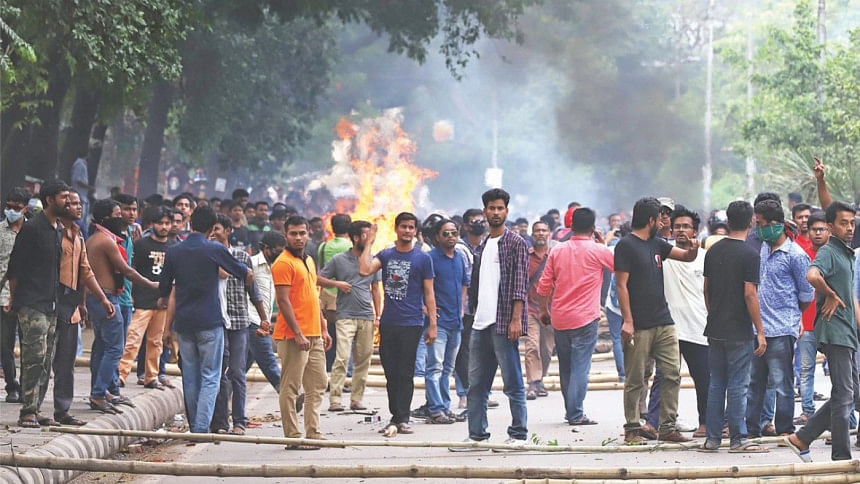The government is right to be afraid

The quota reform movement that exploded on to the nation's radar last week enjoyed enormous public support, especially among university students. I can't underscore enough the extent of its popularity—in a series of surprise resignations, university-level leaders of the ruling party's student wing broke ranks to join the movement.
Such rebellion has seldom happened in recent history, especially at a time when deviating from the party line has brutal consequences for the rebels, as the dissenters at Dhaka University's Begum Sufia Kamal Hall can testify. So, it is worth understanding what makes a young person so angry that he (and very much, she) eschews personal safety for an ephemeral cause. I believe the answer lies in the crisis of unemployment we're facing.
The latest Labour Force Survey 2016-17 found that the unemployment rate of high school and university-educated job seekers are the highest among all levels of education in Bangladesh (15 percent and 11 percent respectively)—this is more than double and triple the unemployment rate of the entire population (four percent). Nearly 30 percent of Bangladeshis between 15-29 years of age are not in education, employment or training; of them, the largest share is in the age groups 25-29 (49 lakhs) and 20-24 (46 lakhs). That's nearly one crore helpless but desperate young people with ample spare time on their hands.
These alarming figures, bad as they are, do not even take into account the plight of the majority who are employed at the lower end of the salary scale. They have very little job security, no social protection and a bleak future ahead. The impact of such precarity early in their careers is usually permanent, with studies showing these workers earn less over their lifetime, have higher health risks, and greater chance of unemployment. Delayed entry into the job market also has knock-on effects on marriage and starting a family, both of which get postponed, causing enormous frustration among young people.
In this scenario, the much-touted GDP growth rate—a remarkable 7.65 percent (surpassing even China's 6.7 percent)—becomes questionable. After all, household real income actually fell by 11 percent since 2010, according to the Household Income and Expenditure Survey 2016. How can we have both soaring GDP growth as well as plunging household income simultaneously?
One answer offered by sceptics is that the growth data is being exaggerated by a regime keen to prove it has kept its end of a Faustian bargain with the citizenry, i.e. they will bring economic development in exchange for curtailed civil rights. Unable to actually deliver on said promise, they've hidden behind flawed data.
Another plausible answer is mounting inequality—those at the top of the food chain are hoarding the benefits of economic growth, depriving the have-nots. The fact that the Gini coefficient, a measure of inequality, rose from 0.458 to 0.483 between 2010 to 2016 provides some evidence for this conjecture. The truth probably lies in a combination of these factors.
The quota reform movement must be understood with the above background in mind. Nearly a crore young people are being told the country's economy is at an all-time high even as they see their futures crumbling before their eyes. A dangerously malfunctioning education system provides no panacea either. Anger, you must then agree, is their only logical response. Unfair treatment in public sector job recruitment, which remains one of the few avenues through which a person can access job security and social protection in a volatile economy, may have been the first flash point of their fury. But, I suspect, it is unlikely to be the last.
In recent history, the Arab Spring arose out of a similar milieu. Many a PhD dissertation has investigated the causes of the Arab Spring; many more are in the offing. Yet a couple of factors that have already found credence in academic literature, which Bangladeshi policymakers ought to find ominous are: the protests were preceded by high rates of youth unemployment, that left an angry population divorced from the fruits of economic growth, along with a paucity of merit-based job recruitment, which further fuelled their resentment. No one, you see, likes being bekar. Especially if they think they don't deserve to be.
It is also worth remembering that the most dangerous civilian political opponent is the middle class. The rich do not need to protest; the poor do not have the time to protest. The middle class, in contrast, is quiescent until they're goaded into protesting. When they do protest though, the results are far reaching. The fact that unemployment rates are highest among the country's educated youth, that the protests were largely urban-focused, and the hubs were university campuses all point to a Bangladeshi middle class reaching the end of their tether.
I am not saying we are headed towards an Arab Spring, far from it! I am, however, saying the stage is set for destabilisation, which no amount of 'benami mamlas' and Digital Security Acts can solve. This destabilisation can manifest itself in many forms, even including greater support for extremism and higher prevalence of crimes. Whatever the manifestation, the outcome will not be conducive to the peace and prosperity we all crave.
I have not said anything here that is unknown to policymakers. Since Bangladeshi policy documents are replete with mentions of our demographic dividend, the authors must surely be aware of the opposite side of the coin, i.e. what happens when the demographic dividend is misused. I was therefore supremely disappointed in the PM's angst-ridden speech in parliament in response to the quota reform movement. It ignored the entire premise of the movement, treating the justifiably angry protesters as children, who have demanded one too many lollipops before bedtime.
Destabilisation is not inevitable. But the insultingly dismissive attitude towards the protesters, coupled with the subsequent vengeance wrought upon them across campuses, indicates destabilisation may become unavoidable in the long run. We deserve better.
Fahima Ali is a doctoral candidate researching international development.





Comments